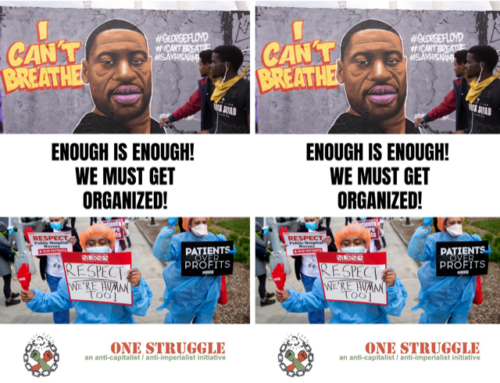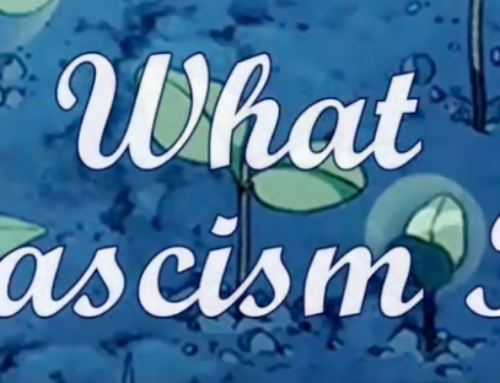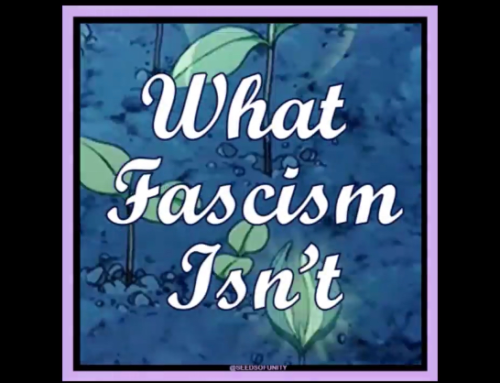by Vincent Kelley
January 2014
Radical sociologist Immanuel Wallerstein recently observed that “[t]he biggest internal debate absorbing the world left for at least the last seventy-five years has been whether identity is a left concept and therefore a left concern”.[i] While this debate has been ongoing, proponents of identity politics and their detractors often fall into rote, ad hominem arguments that do little to illuminate the crux of their disagreement or develop an emancipatory politics, an objective which both sides share. In the pages that follow, I present a third way, if you will, that attempts to move beyond these banal disputes and offer an analysis of identity politics that serves radical organizers in their theorizing of a liberatory political praxis.
While there are numerous definitions of identity politics, in this essay, I subscribe to critical theorist Nancy Fraser’s account of identity-based organizing as “[d]emands for ‘recognition of difference’ [that] fuel struggles of groups mobilized under the banners of nationality, ethnicity, ‘race’, gender, and sexuality.” I also accept Fraser’s premise that “[i]n these ‘post-socialist’ conflicts, group identity supplants class interest as the chief medium of political mobilization. Cultural domination supplants exploitation as the fundamental injustice. And cultural recognition displaces socioeconomic redistribution as the remedy for injustice and the goal of political struggle.”[ii] I argue that, while identity politics—defined as struggles for ‘recognition of difference’—is a necessary starting point and component of radical struggles in a social world ruptured by patriarchy, racism, and heterosexism, among other oppressions, such a politics in itself is not ultimately emancipatory. Further, I contend that radical organizers must relinquish the view that pits identity against class in both theory and practice and instead work to read dialectically the surface contradictions between these concepts.
In her outstanding article “I am a Woman and a Human: A Marxist-Feminist Critique of Intersectionality Theory,” Eve Mitchell, blogging at Unity and Struggle, contends that “identity politics. . . [is] not wrong but [is] incomplete.” She argues that the social division of labor under capitalism “force[s] us into a box: we are a bus driver, or a hair stylist, or a woman.” This division, in turn, “limit[s] our ability to be multi-sided human beings.” Instead of freely engaging in multifarious forms of labor, capitalist relations of production coerce workers into selling their labor-power in (unequal) exchange for wages in the performance of one type of labor.[iii] In this way, the abstract, organic human activity of labor—what Marx calls humanity’s “species character”[iv]—is reified into a fixed identity: “bus driver, or hair stylist, or a woman.” This unique facet of capitalism has led historian John D’Emilio, in his essay “Capitalism and the Gay Identity,” to contend that “Only when individuals began to make their living through wage labor, instead of as parts of an interdependent family unit, was it possible for homosexual desire to coalesce into a personal identity—an identity based on the ability to remain outside the heterosexual family and to construct a personal life based on the attraction to one’s own sex.”[v]
As both Mitchell and D’Emilio’s analyses illustrate, capitalist social relations engender the formation of identities that are conventionally understood by identity politics as autonomous from the social relations of production in class societies.In other words, ‘class’ and ‘culture,’ as well as struggles for ‘redistribution’ and ‘recognition,’ are not unrelated; indeed, the existence of the identities that identity politics seeks to highlight and liberate often cannot be explained without an understanding of their imbrication with historical class antagonisms. This theoretical position has enormous implications for radical political practice, and it is the role of a liberatory praxis, which author Ward Churchill defines as “action consciously and intentionally guided by theory while simultaneously guiding the evolution of theory,”[vi] to navigate the many complexities that arise with the relationship of identity politics to class struggle.
To provide a comprehensive theoretical perspective in service of such a liberatory praxis, it is essential to directly address the relationship between class and culture. Feminist Selma James, in her classic essay “Sex, Race and Class,” incisively notes that the “[t]he word ‘culture’ is often used to show that class concepts are narrow, philistine, [and] inhuman.” However, she argues that “[e]xactly the opposite is the case.” For James, “identity-caste-is the very substance of class” even though identity, conventionally understood, appears to be a separate sphere from the social relations of production under capitalism.[vii] James, in eloquent prose bordering on the poetic, provides concrete examples in support of this theoretical claim:
The life-style unique to themselves which a people develop once they are enmeshed by capitalism, in response to and in rebellion against it, cannot be understood at all except as the totality of their capitalist lives. To delimit culture is to reduce it to a decoration of daily life. Culture is plays and poetry about the exploited; ceasing to wear mini-skirts and taking to trousers instead; the clash between the soul of Black Baptism and the guilt and sin of white Protestantism. Culture is also the shrill of the alarm clock that rings at 6a.m. when a Black woman in London wakes her children to get them ready for the baby minder. Culture is how cold she feels at the bus stop and then how hot in the crowded bus. Culture is how you feel on Monday morning at eight when you clock in, wishing it was Friday, wishing your life away. Culture is the speed of the line or the weight and smell of dirty hospital sheets, and you meanwhile thinking what to make for tea that night. Culture is making the tea while your man watches the news on the telly.
And culture is an ‘irrational woman’ walking out of the kitchen into the sitting room and without a word turning off the telly ‘for no reason at all.’[viii]
Indeed, “delimit[ing] culture” to a realm independent of class obfuscates the real, material conditions that underly the cultural itself. As a result, such a delimited theory of culture precludes the possibility of an emancipatory politics by erroneously positing that struggles against cultural domination can be disentangled from struggles against material exploitation. As James demonstrates, radical struggles against oppression necessarily entail struggles against exploitation.
On this latter point, Marxist cultural critic Teresa Ebert argues that “[s]ocial conflicts stubbornly make the semiotic a site of class struggle.” She further contends that postmodern cultural critique, critique that fails to connect the concrete of the everyday (culture) to the abstract of social totality (the social relations of production) “describes its own unreadable textuality and the opacity of its own writings” but cannot explain the “seemingly autonomous objects and practices” of the cultural tropes it purports to ‘deconstruct’.[ix] On the other hand, emancipatory, materialist critique is a “mode of social knowing that inquires into what is not said, into the silences and the suppressed or the missing, in order to unconceal operations of economic and political power underlying the myriad concrete details and seemingly disparate events and representations of our lives.”[x] In other words, materialist critique is a “de-reification of the everyday.”[xi]
Ebert’s discussion of “topological” (linguistic, postmodern) versus “materialist” (radical, emancipatory) cultural critique highlights an often under-emphasized point vis-á-vis identity politics: The “cultural turn” within academia has effectively expelled class from critique itself.[xii] Critique to demystify ideology has been supplanted by critique to deconstruct discourse. And while the ostensible goal of deconstruction as practiced in ‘postmodern’ literary critique, queer theory, and continental philosophy is to “destabilize group differentiations” and, therefore, the idea of fixed identities, it must first reify the identities it seeks to destabilize (Fraser 87, 83).[xiii] As contemporary cultural critique has trickled down to activist circles, it has served to bolster identity politics, i.e. the further reification of group differences, without progressing to the long-term goal of identity destabilization. But, regardless, destabilization is not an end in itself since freedom from categories (identities) is not freedom from necessity (class).[xiv] Moreover, as we have seen, such categories are inextricably linked to the social relations of production under capitalism and, hence, cannot be fully eliminated absent an engagement with historical class antagonisms. Thus understood, the postmodern trope of ‘destabilization’ is uncannily revealing; it stops short of abolishing alienated categories in its clinging to difference as a transcendent Good, thereby preserving such categories as objects to linguistically toy with in the practice of what Nietzsche and has successors call “play.”[xv]In contrast, materialist critique recognizes that “playing” with alienated categories should be unmasked as an ideological bourgeois linguistic practice in a world divided by the brutal hierarchies of the exploiter and the exploited, the oppressor and the oppressed. Indeed, it is ahistorical, idealist, and even reactionary to neutralize categories that have always been and continue to be deeply political just to preserve them for intellectual “play.”
Closely linked to Ebert’s aforementioned “de-reification of the everyday” is the demystification of, as Marx and Engles put it, the “bourgeois interests” that “lurk in ambush” in the dark corners of capitalist culture.[xvi]
In other words, by fostering divisions within the working class, the bourgeois is able to divert revolutionary struggle away from capital and smugly stand by as political opposition is displaced horizontally among the exploited in the form of racism, patriarchy, an so on. By the same token, the Black Autonomy Federation argues that “so-called ‘white’ people are a contrived super-nationality designed to help the capitalists keep workers of color in their place and safeguard the status quo.” As such, “racism is a class doctrine, used by the state for social control of workers of color” (my emphasis).[xvii] In short, to use Louis Althusser’s term, marginalized identities are interpellated into their ‘place’ in the social relations of production via oppressions such as racism. These oppressions are then internalized by the working class, resulting in a form of intra-class warfare that enables capital to continue its exploitation of labor without mass resistance.
Proponents of identity politics, and anyone fighting injustice and oppression for that matter, recognize that racism, patriarchy, and other oppressions are real and must be dealt with as such. At their best, they identify oppressive behavior for what it is and demand that members of oppressing classes make space for marginalized identity groups within radical organizations and movements. These individual, internal interventions are extremely important, especially in light of the deleterious effects that racists and misogynists have had personally and politically in radical circles. Indeed, it is what James refers to when she states that “we are seeking to break down the power relations among us on which is based the hierarchical rule of international capital.” But when extrapolated to a politics, the previously necessary individual nature of internal anti-oppression work is transformed into individualism, resulting in a bourgeois political praxis that fails to strike at the material roots of oppression itself: “the hierarchical rule of international capital.”
James’s linking of oppression to exploitation has been forgotten in the “privilege discourse” that dominates contemporary identity politics. This discourse consists of individualistic “privilege confessions” in place of collective action to dismantle the structural exploitation and oppression that provides the conditions for the individual behavior that such confessions seek to address. Thus, in privilege discourse, “white privilege” displaces white supremacy, “sexism” supplants patriarchy, and “classism” ousts class. As the blogger at Orchestrated Pulse bluntly states, “privilege work has become a cottage industry of self-help moralizing that in no way attacks the systemic ills that create the personal injustices in the first place.” He further contends that a “substantive critique of privilege requires us to get beyond identity politics. It’s not about good people and bad people; it’s a bad system.”[xviii] Here, beyond is the key word; indeed, identity politics is a necessary starting point for and component of struggles against oppression but is, as Eve Mitchell noted, “incomplete” when divorced from a critique of capitalism.
An analogy may help elucidate the paradoxical necessity and insufficiency of identity-based organizing. To develop technical facility and an understanding of harmony, jazz musicians often practice scales in their formative stages of development. But they don’t practice scales as ends in themselves; the idea is to improvise, a task that requires an ability to think outside—to think beyond—such linear exercises. In other words, the long-term project is to become free from the two common unintended consequences of technical practice for jazz musicians: mindlessness and over-intellectualization. But, even at an advanced stage, jazz musicians will return to practicing scales as a way to maintain their fluid technique and support their improvisatory development.
Identity politics in an emancipatory political praxis functions in a similar way to scale practice in the jazz musician’s development. Like such practice, identity politics is a starting point on the way to emancipation, the latter which can be likened to improvisation for the jazz musician. Just as the musician must know how different scales fit with different chord progressions, the revolutionary must understand and highlight how particular identity groups are disproportionately oppressed under capitalism. But a truly liberatory praxis cannot stop there; it must move beyond identity toward complete emancipation, beyond linear technical practice and toward improvisation, to continue the analogy. However, just as the musician may return to scales time and time again, the revolutionary can do the same with identity by fighting racism, misogyny, heterosexism, etc. inside and outside radical movements. But, contrary to conventional identity politics, the goal is not to assert identity qua identity, just as the jazz musician’s goal is not to hone technique qua technique. Instead, in the same way as the improviser must free herself from mindlessness and over-intellectualization by going beyond scale practice, the revolutionary must free herself from identity reification and sectarianism, the two common unintended consequences of identity politics. In short, an emancipatory politics must go beyond identity.
With this analogy in mind, I would like to quote cultural theorist Michael Rectenwald’s abstract illumination of the “incomplete[ness]” of identity politics:
The problem with identity politics, then, is that it is one-sided and undialectical. It treats identities as static entities, and its methods only serve to further reify those categories. It aims to liberate identity groups (or members thereof) qua identity groups (or individuals), rather than aiming to liberate them from identity itself. Identity politics fails not because it begins with various subaltern groups and aims at their liberation, but because it ends with them and thus cannot deliver their liberation. It makes identities and their equality with other “privileged” groups the basis of political activity, rather than making the overcoming of the alienated identity, for themselves and all identity groups, the goal.[xix]
In other words, identity politics starts in the right place by organizing “subaltern groups” against oppression, but, in an effort to demand ‘recognition of difference,’ it loses sight of its emancipatory aims, reaffirming fixed identities instead of abolishing the “the hierarchical rule of international capital” and the “alienated identit[ies]” this rule engenders. Moreover, it fails to see that it is capitalist ideology that reifies identities. Indeed, to adduce Teresa Ebert once more, identities, like “meanings,” “are never stable and fixed because they are social relations, and social relations are effects of class conflicts and contradictions.”[xx] Hence, a liberatory anti-oppression praxis should seek to overcome alienated identities by transforming the social relations of production, namely, ending capitalism.
Here, it is important to note that leftists themselves have been guilty of instituting their own form of identity politics, “the kind of policing of the category of ‘working class’ that marked the Old Left and that, with exceptions, continues to mark Marxist politics at present.”[xxi] Just like other forms of identity politics, such a “policing” can reify group identity, thereby undermining the struggle, in this case, for a classless society. Indeed, it is essential to identify the exploiter and exploited, but clearly not enough to stop there. Classes should be defined insofar as definitions lead to a liberatory praxis for their abolition, not a naturalization of their existence.
Sectarianism within the Left has also bordered on a form of identity politics, with equally lamentable consequences. Labeling oneself as a Leninist, anarchist, Maoist, libertarian socialist, etc. has taken on more importance for some leftists than actually organizing to end capitalism. Moreover, these labels ossify theory, which should be adaptive in response to ever-changing material conditions, thereby leading to dogmatism and ineffective practice. In short, leftists should look historically at their own role in the perpetuation of identity policing and seek to move beyond such a non-emancipatory politics.
To conclude, I would like again to invoke Eve Mitchell, who captures the essence of identity politics’ double-edged sword: “Embracing womanhood, organizing on the basis of blackness, and building a specifically queer politics is an essential aspect of our liberation. It is the material starting point of struggle.” But “[i]dentity politics reproduces the appearance of an alienated individual under capitalism and so struggle takes the form of equality among groups at best, or individualized forms of struggle at worse.” Instead of treating identity as an end in itself, Mitchell argues that we need to struggle for “a society that completely abolishes, or transcends, ‘identities.’”[xxii] To do this, we must move beyond the platitudinous arguments of both sides of the “[t]he biggest internal debate absorbing the world left for at least the last seventy-five years” and study and engage the surface contradictions between identity and class in service of a truly emancipatory politics.
NOTES:
#
[i] Immanuel Wallerstein, “Identity Politics and Left Activism,” Monthly Review 65(5) (October 2013), http://monthlyreview.org/2013/10/01/identity-politics-left-activism.
[ii] Nancy Fraser, “From Redistribution to Recognition? Dilemmas of Justice in a ‘Post-Socialist’ Age,” New Left Review I(212) (July-August 1995): 68.
[iii] Eve Mitchell, “I am a Woman and a Human: A Marxist-Feminist Critique of Intersectionality Theory,” Unity and Struggle, September 12, 2013, http://unityandstruggle.org/2013/09/12/i-am-a-woman-and-a-human-a-marxist-feminist-critique-of-intersectionality-theory/.
[iv] Karl Marx, “Estranged Labour,” In Economic and Philosophical Manuscripts of 1844, Marxists.org,http://www.marxists.org/archive/marx/works/1844/manuscripts/labour.htm.
[v] John D’Emilio, “Capitalism and the Gay Identity,” In Powers of Desire: The Politics of Sexuality, ed. Ann Snitow et al., (New York: Monthly Review Press, 1983), 104-105, http://platypus1917.org/wp-content/uploads/readings/demilio_captialismgayid.pdf.
[vi] Ward Churchill, “Pacifism as Pathology: Reflections on the Role of Armed Struggle in North America,” (Winnipeg: Arbeiter Ring Publishing, 1998): 84, http://takku.net/mediagallery/mediaobjects/orig/f/f_ward_churchill_-_pacifism_as_pathology.pdf.
[vii] Selma James, “Sex, Race and Class: How capitalism and the Left have mystified the real relationships between these categories,” Libcom.org, July 24, 2005, http://libcom.org/library/sex-race-class-james-selma
[viii] Ibid.
[ix] Teresa L. Ebert, The Task of Cultural Critique (United States: University of Illinois, 2009), 39, 52.
[x] Ebert, The Task of Cultural Critique, 94.
[xi] Ebert, The Task of Cultural Critique, 30.
[xii] Ebert, The Task of Cultural Critique, 182.
[xiii] Fraser, “From Redistribution to Recognition?,” 87, 83.
[xiv] Teresa L. Ebert and Mas’ud Zavarzadeh, “Daily Lessons on Class,” Red Critique 12 (Winter/Spring 2007), http://redcritique.org/WinterSpring2007/dailylessonsonclass.htm.
[xv] Ebert, The Task of Cultural Critique, 16.
[xvi]Karl Marx and Friedrich Engels, “Bourgeois and Proletarians” In 1848: Manifesto of the Community Party, Marxists.org, http://www.marxists.org/archive/marx/works/1848/communist-manifesto/ch01.htm#007. Selma James cuts right to the heart of these interests when she maintains that
The social power relations of the sexes, races, nations and generations are precisely, then, particularized forms of class relations. These power relations within the working class weaken us in the power struggle between the classes. They are the particularized forms of indirect rule, one section of the class colonizing another and through this capital imposing its own will on us all.# James, “Sex, Race and Class.”
[xvii] “Capitalism and Racism: An Analysis of White Supremacy and the Oppression of Peoples of Color,” Facebook, November 18, 2013, https://www.facebook.com/notes/black-autonomy-federation/capitalism-and-racism-an-analysis-of-white-supremacy-and-the-oppression-of-peopl/621099611285981.
[xviii] “Tim Wise and the Failure of Privilege Discourse,” Orchestrated Pulse, October 1, 2013, http://www.orchestratedpulse.com/2013/10/tim-wise-failure-privilege-discourse/?fb_ref=recommendations-bar.
[xix] Michael Rectenwald, “What’s Wrong With Identity Politics (and Intersectionality Theory)? A Response to Mark Fisher’s “Exiting the Vampire Castle” (And Its Critics),” The North Star, December 2, 2013, http://www.thenorthstar.info/?p=11411.
[xx] Ebert, The Task of Cultural Critique, 188.
[xxi] Rectenwald, “What’s Wrong With Identity Politics (and Intersectionality Theory)?”
[xxii] Mitchell, “I am a Woman and a Human.”






I like the valuable info you provide in your articles. I’ll bookmark your blog and check again here frequently. I’m quite certain I will learn a lot of new stuff right here! Best of luck for the next!